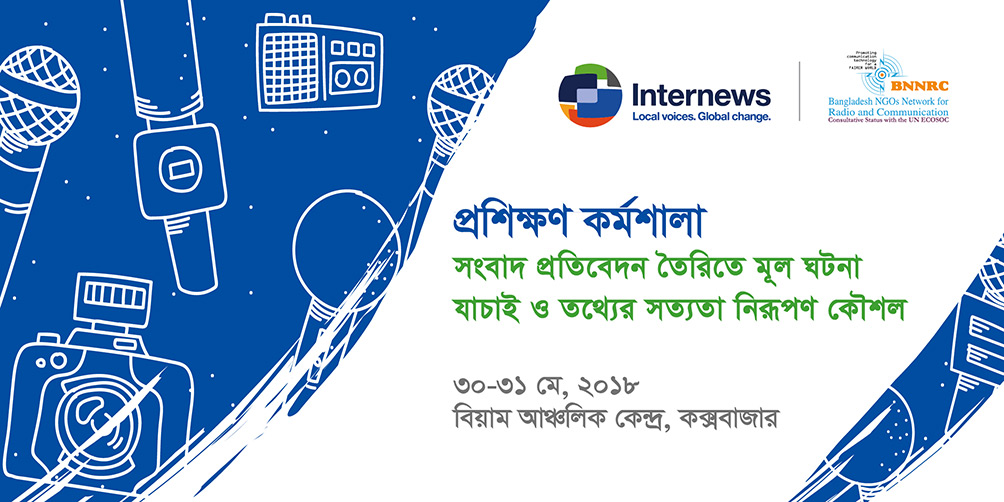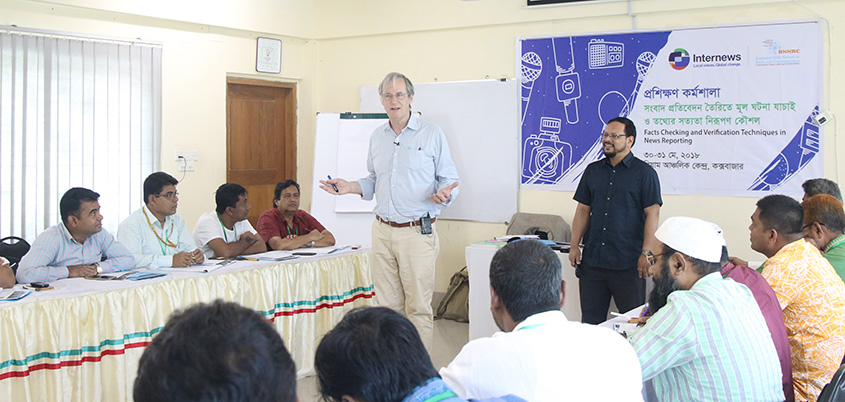30-31 May 2018, Cox’s Bazar, Bangladesh
Vanue: BIAM Foundation, Regional Center, Cox’s Bazar
Facilitator: Mr. Nicholas Nugent, Consultant in Broadcasting and Journalism, UK
List of Workshop Participant
Program Schedule
| DAY ONE | 30 May 2018 |
|---|---|
| 10:00-10:15am | Registration |
| 10:15-11:00 am | Welcome & Introductions Discussing Newsroom Roles Performed What do you want to achieve from this workshop (listening to the trainees’ learning expectations or objectives)? Who is your audience Understanding your audience – discussion on readers/listeners feedback? What does your audience expect from your coverage (dialogue with readers/listeners on social media, maybe call-ins or emails)? Outcome: Determining trainees’ reporting experience and their audience; clarifying workshop objectives; coming back to trainees’ expectations at end of training. |
| 11:00 am -12:00 noon | The Role of the Reporter is based on Trust Gaining audience/readership trust. ‘Better right than first.’ Principle values of good reporting and how to achieve them. What to believe? sourcing the news, putting value on sources and fact checking: BBC ‘Reality Check’ and similar initiatives Seeing both sides: how to get there (football analogy) The essential position of the reporter/journalist and how it works in practice |
| 12:00-12:30 pm | True or false? Expanding and putting into practice the values and principles discussed – remembering you are serving your audience/readership How to verify news reports – to share or not to share? Verifying photos and videos Case Study 1 |
| 12:30-1:00pm | Objectivity in practice. Issues of bias or belonging for journalists – examples from Northern Ireland (for e.g.) and Crimea (‘the hero of my story’) Dealing with one’s own prejudice, and examining how principles of good journalism can be applied How to avoid using stereotypes (on race, ethnicity, gender for e.g.) Understanding neutral language Outcome: Understanding the necessity to look at motivating factors behind conflict; Knowing who the actors are and the role they can play in resolving it |
| 1:00-1:30 pm | NETWORKING BREAK |
| 1:30-2.30 pm | Fake News: what it means and how to overcome it Different definitions What distinguishes journalism from blogging? ‘Disinformasiya’ (as ‘fake news’ is known in Russia!) Does it happen here? What kind of stories can improve host and refugee community relations? (Creating a sense of community) Building peace, improving refugee-host community relations, through good news reporting Outcome: Understanding of accurate news versus disinformation or lazy reporting in the Rohingya context |
| 2:30-3:00 pm | Summarizing the First Day Overnight Assignment: Looking for bias or questionable ‘facts’ in sample news reports |
| DAY TWO | 31 May 2018 |
|---|---|
| 10:00-10:45 am | Analyze news reports from Overnight Assignment Participants discuss selected news reports from local and international media Outcome: Participants have a better understanding of the common mistakes in journalism – avoiding bias, stigma and dehumanization |
| 10:45-11:45 am | Interview techniques: Participants interview and present each other to group How to ask better questions in an interview (open ended vs close ended; avoid double barreled questions, listening attentively and asking good follow up questions) How to approach an interview subject sensitively (not being aggressive, asking questions nicely, not being too pushy) Outcome: Assessing trainee interview techniques and challenges |
| 11:45 am-1.00 pm | Classroom exercise: Being Editor for a day Distinguish truth from fiction and the importance of checking, not always believing sources. Managing your resources Determining the lead story Overcoming Internal/external pressures on the Editor Remaining true to your journalistic ideals |
| 1:00-1:30 pm | NETWORKING BREAK |
| 1:30-2:00 pm | Completing ‘Editor for the Day’ exercise |
| 2:00-3:00 pm | Pulling it all together What lessons have you learned about good journalism, being balanced impartial, overcoming biases and using neutral language? How will this training improve your future reporting/journalism? Outcome: Do you have any new ideas or techniques, or story ideas, to take back and discuss with your editors? |
| 3:00-3:30 pm | Closing: Remarks by Chief Guest, Special Guest, Distribution of Certificates |
Picture of Workshop:
Trainer Nicholas Nugent attending a session at a workshop in Cox’s Bazar on the first-day of the training programme.
M D Kamal Hossain, Deputy Commisioner of Cox’s Bazar handing over certificate to one of the participants after completion of the workshop.
Participants pose for a group photo after completion of their workshop. Zain Al Mahmood, Country Director of Internews along with the course trainer Nicholas Nugent are also seen.




